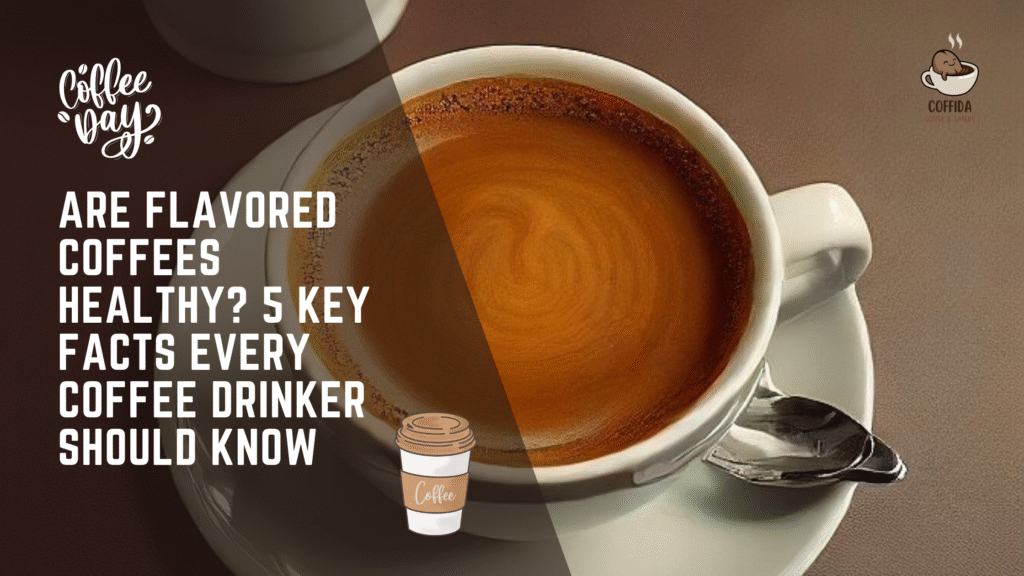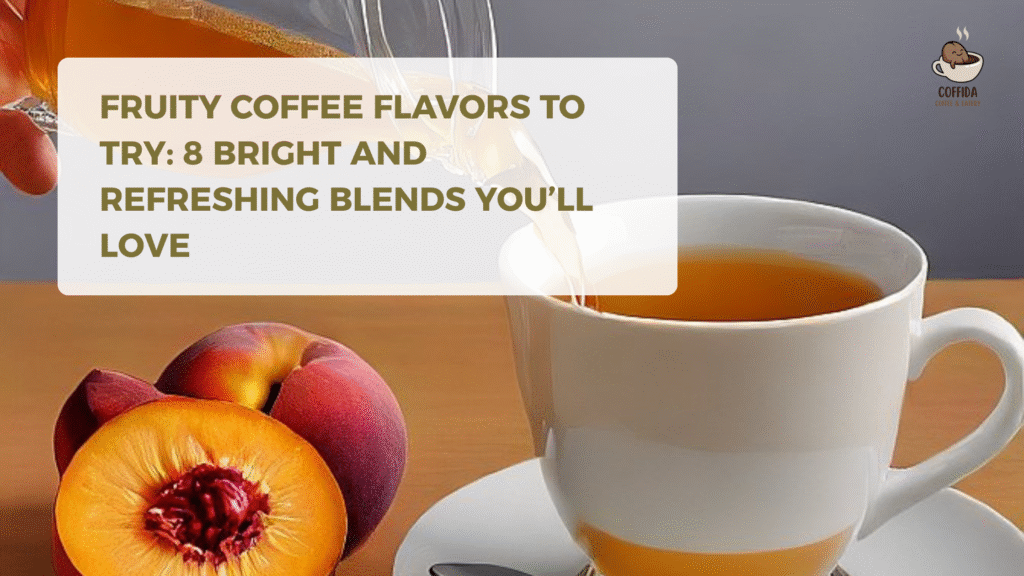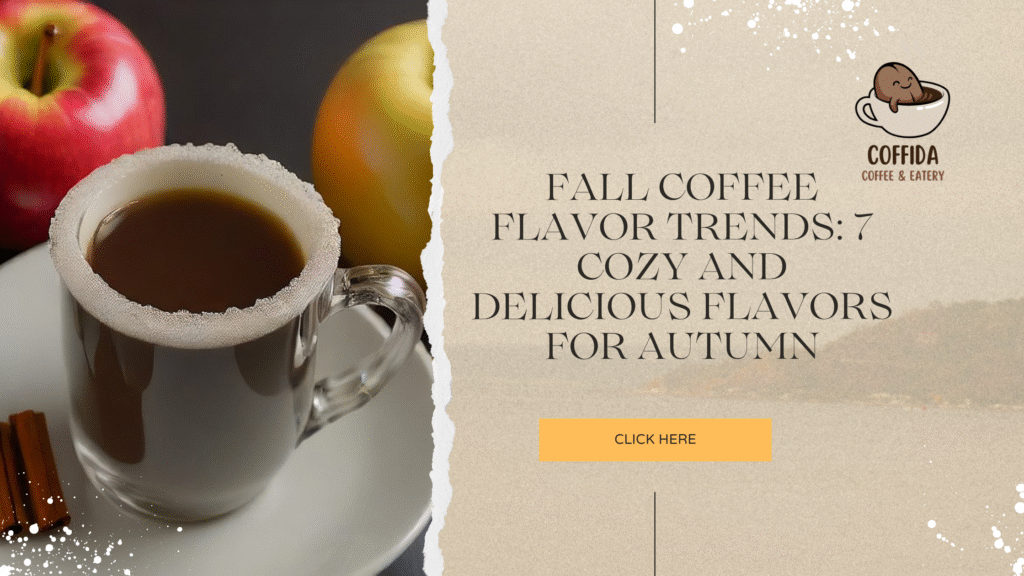Table of Contents
Introduction: The Sweet Truth About Flavored Coffee
Coffee is not a daily routine; it is a personal journey. To many coffee enthusiasts, nothing will sound sweeter than a freshly roasted coffee with a great combination of vanilla, hazelnut, or caramel. Not to mention gourmet roasters, specialty coffee in your corner convenience store, and the more well-known cafes across the street. But now that it has become more popular, a question takes relevance: are flavored coffees healthy?

It is indeed a valid worry. As it happens, there are numerous syrups, sweeteners, and artificial flavors being used, and flavored coffees tend to blur the boundary between a cup of beverage and a dessert. And as good as they might taste, not all flavored coffee products are equal.
In this article, we are going to have more in-depth attention to the reality of flavored coffees and how this java-by-flavor affects your health. You may be a hyper latte drinker or a weekend coffee gulper, but by the end of this self-esteem class, you will gain a conception of what goes into your cup and how to appreciate it more consciously.
What Exactly Is Flavored Coffee?
Just to be on the same ground, what do we mean when we say flavored coffee – not all flavored beverages are equal?
1. Flavored Coffee Beans
They are normal coffee beans that are combined with natural or artificial flavors once roasted. Typical ways of doing it are spraying beans with flavored oils or soaking the beans in additives to resemble flavors such as hazelnut, cinnamon, pumpkin spice, or chocolate.
2. Syrups and Creamers
It is this kind of flavoring you will come across in these cafes or at home when preparing beverages. Baristas use pumps of sweet syrups such as vanilla, mocha, or peppermint and compound and merchandise these with dairy or non-dairy creamers, which are already flavored.
3. Natural Flavor Additions
All flavored coffee does not depend on chemicals. To add a taste to their coffee, others add some things naturally, such as cinnamon sticks, cocoa powder, vanilla extract, or nut milk. These may give texture and sweetness, and it does not require additional measures of sugar or even artificial additives.
Are Flavored Coffees Healthy? 5 Key Facts Every Coffee Drinker Should Know
1. Most Flavorings Are Safe—But Quality Matters
The flavoring agent applied in most flavored coffee products, particularly those of genuine brands, is of good quality and has been certified by the FDA as safe to use in moderate doses. But the quality of such flavorings is very different.
Watch out for:
- Propylene glycol is a shared ingredient in many artificial flavors, but preferred by some individuals prefer to avoid it.
- Natural flavors. These are nonspecific and still can have a synthetic treatment.
- Poor quality beans: Low-quality brands suppress the low-quality coffee behind excessive taste oils.
Health tip: Beans labeled 100% Arabica, and check the brands that have details on their flavor addition.
2. Sugar Is the Real Concern in Most Flavored Coffees
What do we really mean by an inquiry like, Are creme coffees good for you? We are not always enquiring after the coffee–we are enquiring after the sugar.
Flavored syrups and creamers, which may be sweetened with as much as 30-odd grams (6+ teaspoons) in a cup, may also be quite excessive.
An overload of sugar is associated with:
- Weight gain
- Spikes in blood sugar
- Inflammation
- Greater threat of heart illness and type 22 diabetes
Health hint: When out, ask people at cafes to have half-sweet, or at home, apply sugar-free syrups.
3. Calories Add Up Faster Than You Think

Plain black coffee contains nearly no calories; however, when flavored, it can contain hundreds of additional calories, particularly when flavored and combined with milk, cream, or whipped topping.
Occasions of indulgence are still okay, but consuming flavored coffee such as this on a daily basis can actually ruin your health plans- unless you are on a weight watch or sugar level control.
Health tip: Use smaller sizes, or go with skimmed milk or plant milk, and no whip.
4. Sensitive Stomachs May React to Additives
More cost-effective sacrificial coffees contain artificial flavoring ingredients and chemical solvents that may aggravate your tummy, even when you are not hypersensitive to acidity or happen to get a bout of acid reflux or IBS.
Some of its common problems are:
- Acidic aftertaste
- Nausea/Flatulence
- Jitters or heartburn (particularly low-quality brews
How it is done:
- Select naturally flavored coffee or do it yourself at home.
- Opt for low-acid beans and desist from excessively roasted mixes that have excessive spraying of chemicals.
- This will be taken after food and not on an empty stomach.
5. Healthy Flavored Coffee Alternatives Exist
The great news is that I got two children by way of a lottery drawing. It does not mean that you should quit using flavored coffee to be healthy. All you need is to be smarter with your choices.
Better Options Include:
- Of course, naturally flavored beans (e.g.,cinnamon-infused, vanilla bean roasted)
- Home cooking of flavors using spices and extracts
- Syrups with low sugar or no sugar at all, such as those of Jordan Skinny Mixes or SweetLeaf
- Unsweetened milk that is based on nuts, which can include almonds or pistachios
- A sprinkling of cocoa powder, cinnamon, or cardamom on your brew
These substitutes will provide you with a scrumptious flavor and irresistible feeling, but without compromising on your well-being.
Check Out: Fruity Coffee Flavors to Try: 8 Bright and Refreshing Blends You’ll Love.
Tips for Enjoying Flavored Coffee Without the Health Guilt
Do you love your vanilla latte or caramel iced coffee? Quit it cold turkey: no need to do so. Ready for some easy substitutions and tips to quiet down your flavored coffee habit without losing health and sanity:
Choose Quality Over Quantity
- Avoid flavored syrups that are of artificial colors or preservatives
- Purchase flavored beans of honest roasters with clear tags
Make It at Home
- Add cinnamon or vanilla extract, nutmeg, or drops of peppermint oil
- To add a little flavor, mix it with nut butter (such as almond or hazelnut butter)
Go Light on the Sweeteners
- Order half a syrup in cafes
- Sugar-free: You can use monk fruit, stevia
- To sweeten your coffee, add more milk or ice to dilute it
Try Plant-Based Creamers
- Oat milk, Almond milk, and coconut milk-based creamers should be sought out.
- Ensure that they are non-sweetened and do not contain a lot of ingredients
Limit to Once a Day (or a Few Times a Week)
- Take a flavored coffee as a treat, instead of all-day coffee
- Alternates: Alternate plain brew coffee, herbal coffee, or black coffee to add natural flavor infusions
The Verdict: Are Flavored Coffees Healthy or Harmful?

Then, are flavored coffees healthy? The reply lies in the way they happen to be flavored and the quantity of what you take.
Here is the short version:
- Sweetness-free flavored beans? Of generally safe composition, often low-calorie
- Colored syrups and sweetened liquids? Delicious and sugar-packed and caloric
- Dessert-style beverages every day? Eat it in moderation rather than as a healthy food.
Conclusion:
It is sweet, warm, and comfortable; it is all that a person wants to drink when sipping a vanilla latte in the morning or a hazelnut mocha on a comfortable day off. However, as we have touched on so far in this guide, it is not merely whether flavored coffee is bad or not that matters- it is, in fact, more about how we consume the coffee.
The fact is that all the flavored coffees might be healthy, though it all depends on the ingredients you prefer using and on the way you take them.
A lot of the flavored coffee, and particularly the varieties of flavored coffee with artificially sweetened syrups and heavy creamers, can insidiously pack on extra sugar, undesirable calories, and chemical additives to your drink, and potentially influence your energy level, your digestive system, or your long-term health. A couple of high-sugar lattes or mochas throughout the day is enough to exceed your daily sugar allowance without you being aware of exactly what a high-sugar latte or mocha is intended to give you.
Use high-quality coffee beans. Do you have a chocolatey/nutty sense about you? Well, then, go with naturally flavored beans with no sugar added. If you are a fan of cafe-style drinks, learn to take charge of your own ingredients at home. Substitute almond milk with any variety you like and a pinch of cinnamon or some drops of vanilla essence to produce your personalized, tasting drink. Just a little cocoa powder or cardamom will also turn an ordinary cup into an awesome one, and in this way, you will not lose your health.
And when you start that craving to have something that is on the side of indulgence, there is nothing wrong with it either. A cup of caramel latte or peppermint mocha can be a beautiful experience, and this delicious drink should not be allowed to become the only drink of coffee. Eat it sometimes, take bites and enjoy every moment of it, and counteract it with better choices throughout the rest of the day.
As all after, the healthiest type of coffee is the one that feels good not only to the aroma but also to your health. Yes, coffee, even when it is flavored, could be healthy. They say it is all about having a balance, moderation, and knowing what is in your cup.
Here is the next time when you take that sweet coffee, you will want to ask:
- What do I bring to the mix?
- What proportion of sugar does it in it?
- Is there a way I can substitute this with something better?
With each mindful drink, you are taking something that can be considered a healthy routine or ritual, unlimited by guilt or taste.
Then do so. Enjoy that restful, scentful pot. Put in the flavor that you love. The only thing you have to bear in mind is that, as with all good things in life, the trick is moderation.
For more info: Click Here.
FAQs: Flavored Coffee & Health
Q1. Does it hurt your body if you consume artificially flavored coffees?
Not necessarily. The majority of them consist of FDA-approved elements. But low-quality brands might contain solvents or chemical carriers that not all people want to use. Use flavored beans that are natural or of high quality.
Q2. How is it possible to add taste to coffee healthily?
Do it yourself is the best: use cinnamon, vanilla extract, unsweetened cocoa, or milk on the basis of Nuts. You regulate the ingredients, the sugar content, and the intensity of flavor.
Q3. Does flavored coffee cause weight gain?
It actually is not, unless it has been prepared without extra sugars or heavy creamers. However, weight loss is hampered by sweetened cafe beverages, which contain hundreds of undeclared calories.



